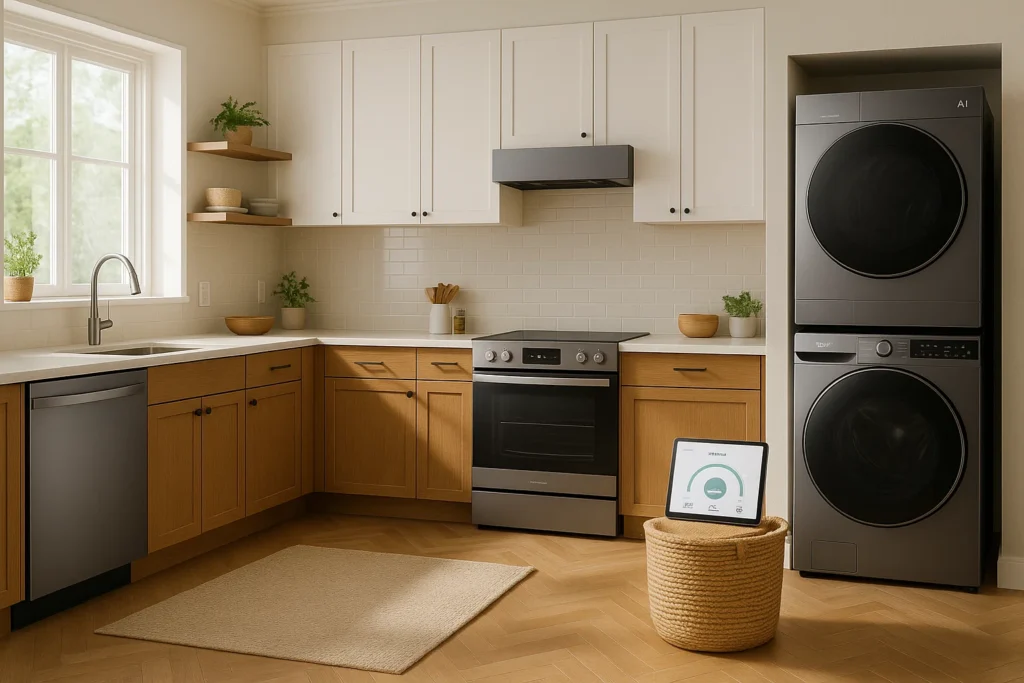Discover how Samsung’s AI appliances in 2025 are making U.S. homes smarter, practical, and energy-efficient—without the marketing hype.
Introduction: The Shift to Smarter Homes
The idea of a “smart home” isn’t new. For years, tech companies have promised futuristic living—fridges that order groceries, ovens that cook for you, and washing machines that never miss a beat. Yet, many of these promises felt more like marketing hype than reality.
In 2025, Samsung is taking a different route. Instead of flashy gimmicks, it’s embedding Agentic AI and practical intelligence into its home appliances. Think refrigerators that manage food freshness with precision, washers that optimize cycles for water and energy savings, and ovens that adjust heat in real time to avoid overcooking.
For U.S. homeowners, Samsung’s AI isn’t just about convenience—it’s about efficiency, cost savings, and realistic value. Let’s dive deep into how Samsung’s AI appliances are reshaping daily life in 2025.
1. Moving Past the “Hype Cycle” of Smart Homes
Back in the 2010s, smart home hype was everywhere. Companies showcased Wi-Fi-connected gadgets that looked futuristic but didn’t truly solve real problems. For example:
- Smart fridges that recommended recipes but couldn’t tell if your milk had spoiled.
- Dishwashers with apps but little impact on water or energy use.
- Devices that were expensive, confusing, and often incompatible with each other.
By 2020, consumer fatigue had set in. According to Statista, over 56% of U.S. households owned at least one smart device by 2022, but many reported underutilization.
Samsung’s approach in 2025 is noticeably different. Instead of hype, it’s focused on practical AI integration—making appliances smarter in ways that directly improve household life.
2. Samsung’s AI Philosophy: Invisible but Powerful
Samsung calls its 2025 home tech vision “AI Without the Noise.” This philosophy prioritizes:
- Seamless integration – AI that works in the background, not requiring constant user input.
- Energy efficiency – Smart appliances that lower bills and reduce environmental impact.
- Interoperability – Compatibility with existing smart ecosystems (Google Home, Alexa, SmartThings).
- Trust & privacy – Transparent data policies to win over U.S. consumers who remain cautious about AI monitoring in their homes.
This invisible AI approach is what makes Samsung stand out in 2025—it doesn’t try to wow you with sci-fi demos but rather improves everyday tasks quietly.
3. The AI-Powered Refrigerator: Food Management Reimagined
The refrigerator has always been the centerpiece of the kitchen, and in 2025, Samsung’s AI-powered Bespoke AI Refrigerator is turning it into a true household assistant.
Key Features for U.S. Households:
- Food Freshness AI: Sensors detect spoilage levels in fresh produce and notify you when items are nearing expiration.
- Grocery Inventory Sync: Connects with grocery apps like Instacart or Walmart+ to automatically reorder essentials.
- Energy Smart Mode: Adjusts cooling cycles based on household activity (e.g., weekends vs. workdays) to save energy.
- Recipe AI: Instead of gimmicky recipe pop-ups, it curates suggestions based on what you actually have left inside.
📊 Impact: A U.S. family of four wastes an average of $1,500 worth of food per year (USDA). Samsung’s AI fridge could potentially reduce this by 20–25%.
4. AI Washing Machines: Smart Laundry Without Overcomplication
Laundry has long been a chore where “smart features” added little value. But in 2025, Samsung’s AI EcoBubble Washers focus on efficiency and convenience, not gimmicks.
Benefits for American Consumers:
- Cycle Optimization: AI identifies fabric types and soil levels, adjusting detergent and water use automatically.
- Energy Monitoring: Integrates with U.S. utility smart meters to run cycles during off-peak hours, lowering electricity bills.
- Maintenance Alerts: Predicts filter clogs or part replacements before breakdowns.
📉 Savings: With the average U.S. household running 300+ loads annually, AI-optimized cycles can save 3,000 gallons of water and reduce energy use by 20% per year.
5. AI Ovens and Cooking Appliances: Precision Meets Convenience
Cooking is where Samsung’s AI really shines. Its AI Dual Cook Pro Oven (2025 edition) brings chef-level precision into U.S. kitchens.
- Real-Time Heat Adjustment: AI senses food type and adjusts heat zones to prevent burning.
- Recipe Learning: Learns your cooking style—whether you like your pizza crispy or your cookies chewy.
- Health Integration: Syncs with Samsung Health to recommend meals aligned with dietary goals.
For busy American families, this isn’t about futuristic kitchens—it’s about saving time and getting consistent results.
6. AI Dishwashers: Cleaner, Greener, Smarter
Dishwashers are notorious for inefficiency, but Samsung’s AI WaterJet Dishwashers are closing that gap.
- Load Recognition: AI detects how full the machine is and adjusts water use.
- Soil Detection: Sensors analyze grime levels and target spray jets accordingly.
- Eco-Scheduling: Suggests wash times based on your energy provider’s peak hours.
This is particularly appealing to eco-conscious U.S. households trying to cut utility bills and water waste.
7. Energy Efficiency: The Hidden Value for U.S. Consumers
One of the biggest wins from Samsung’s AI appliances is their impact on energy efficiency.
- U.S. households spend about $2,060 annually on utilities (EIA 2024).
- Samsung AI appliances can potentially lower this by 8–12% annually through smart cycles, optimized usage, and predictive maintenance.
In a time when inflation is pressuring American budgets, this practical value—not just flashy features—makes Samsung’s AI appealing.
8. SmartThings AI Hub: Connecting the Dots
Samsung’s SmartThings AI Hub is central to its 2025 vision. Unlike early “smart hubs” that were clunky and inconsistent, this hub:
- Connects all Samsung appliances under one AI-driven ecosystem.
- Works with third-party devices like Nest thermostats and Philips Hue lights.
- Predicts routines (e.g., lowering fridge cooling when you’re on vacation).
- Provides real-time dashboards for energy and water usage.
For U.S. consumers juggling multiple devices, this level of integration solves the “app overload” problem that plagued smart homes for years.
9. Privacy & Security: Winning U.S. Trust
Privacy remains a major concern in the U.S., where consumers are cautious about AI monitoring their daily lives.
Samsung’s 2025 appliances emphasize:
- On-Device AI Processing: Sensitive data (like food inventory or laundry habits) stays local, not uploaded to the cloud.
- User Control: Clear toggles for data sharing and AI suggestions.
- Transparency Reports: Samsung releases annual disclosures about how appliance data is used.
This transparency is helping Samsung build trust in an era when AI skepticism is rising.
10. The Competitive Landscape: Why Samsung Stands Out
Other players like LG, GE, and Whirlpool are also pushing AI appliances in 2025, but Samsung’s edge lies in:
- Holistic ecosystem integration (SmartThings, Galaxy, TVs, smartphones).
- Focus on subtle, invisible AI rather than over-marketed features.
- Strong U.S. partnerships with retailers (Best Buy, Home Depot) and service providers.
This positions Samsung as a leader in practical AI living rather than hype-driven gadgets.
11. Challenges Ahead: The Roadblocks
Despite the progress, Samsung still faces hurdles in the U.S. market:
- High upfront costs: AI appliances are still more expensive than traditional ones.
- Learning curve: Some U.S. consumers remain skeptical or find AI settings confusing.
- Longevity concerns: Will AI-enabled appliances last as long as older, simpler models?
These are valid concerns, but Samsung’s extended warranties and repair programs are addressing them.
12. What This Means for U.S. Households in 2025
Samsung’s AI appliances represent a turning point for smart homes in America. Instead of overpromises and gimmicks, they deliver:
- Lower bills through energy savings.
- Reduced food and water waste.
- Convenience without complexity.
- Greater compatibility with existing ecosystems.
In short, Samsung is making AI practical, not performative.
Conclusion: Smarter Homes Without the Hype
For years, smart home technology felt more like a sales pitch than a solution. In 2025, Samsung is rewriting that narrative.
Its AI appliances—refrigerators, washers, ovens, and more—are not about impressing you with futuristic features. They’re about making life easier, cheaper, and more efficient for American households.
By focusing on practical benefits, energy savings, and privacy-first design, Samsung is showing that AI doesn’t have to be noisy to be powerful.
The future of smart homes isn’t about hype—it’s about quiet intelligence that works when you need it and fades into the background when you don’t.
For U.S. families looking to modernize their homes in 2025, Samsung’s AI appliances strike the perfect balance: smarter living without the noise.

